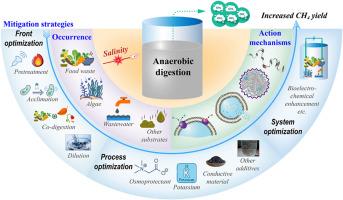厌氧消化过程中盐分的影响、作用机制和缓解策略评述
IF 16.3
1区 工程技术
Q1 ENERGY & FUELS
引用次数: 0
摘要
在大多数情况下,盐胁迫会影响厌氧消化(AD)过程并降低甲烷产量。这篇综述描述了厌氧消化过程中常见基质(如厨余、有机废水和藻类)盐分的发生和影响,并从微生物群落、关键基因和酶的角度阐明了盐分影响厌氧消化的机制。厌氧消化(AD)过程中的盐度主要来自基质中的化学添加剂(如厨余中的盐)或基质本身(如含盐藻类)。低盐度可促进甲烷的产生,因为适当的 Na+ 浓度可促进 ATP 合成和 NADH 氧化,从而促进微生物的新陈代谢。高盐度会导致不耐盐碱的微生物溶解,改变微生物群落,使关键酶失活,从而阻碍甲烷生成。微生物可以采取 "盐入 "和 "兼容溶质 "策略来抵抗盐胁迫。此外,法定量感应也被认为是一种潜在的防御机制。受这些细胞生存机制的启发,我们从前沿优化(预处理、共消化、接种物适应、稀释)、过程优化(添加渗透保护剂、钾、导电材料和其他添加剂)和系统优化(生物电化学增强)三个方面阐述了抑制策略。本综述为进一步研究制定合适的缓解策略提供了指导,以提高不同盐度胁迫条件下的甲烷产量。本文章由计算机程序翻译,如有差异,请以英文原文为准。

A critical review of effects, action mechanisms and mitigation strategies of salinity in anaerobic digestion
Salinity stress affects the anaerobic digestion (AD) process and reduces methane production in most cases. This review described the occurrence and impacts of salinity from common substrates (e.g., food waste, organic wastewater and algae) in AD process, and elucidated the mechanisms by which salinity affects AD from the perspectives of microbial community, key genes and enzymes. Salinity in AD comes mainly from chemical additives in the substrate (e.g., salt in food waste) or from the substrate itself (e.g., saline algae). Low salinity can promote methane production, as appropriate Na+ concentrations can promote ATP synthesis and NADH oxidation, thus facilitating microbial metabolism. High salinity leads to lysis of salt-intolerant microbes, altering the microbial community and inactivating key enzymes, thereby blocking methanogenesis. Microbes can adopt “salt-in” and “compatible solute” strategies to resist salt stress. In addition, quorum sensing is also considered as a potential defense mechanism. Inspired by these cell survival mechanisms, the disinhibition strategies were elaborated from three aspects, namely front optimization (pretreatment, co-digestion, inoculum acclimation, dilution), process optimization (addition of osmoprotectants, potassium, conductive materials and other additives), and system optimization (bioelectrochemical enhancement). This review provides guidance for further studies on developing suitable mitigation strategies to enhance methane production under different salinity stress conditions.
求助全文
通过发布文献求助,成功后即可免费获取论文全文。
去求助
来源期刊

Renewable and Sustainable Energy Reviews
工程技术-能源与燃料
CiteScore
31.20
自引率
5.70%
发文量
1055
审稿时长
62 days
期刊介绍:
The mission of Renewable and Sustainable Energy Reviews is to disseminate the most compelling and pertinent critical insights in renewable and sustainable energy, fostering collaboration among the research community, private sector, and policy and decision makers. The journal aims to exchange challenges, solutions, innovative concepts, and technologies, contributing to sustainable development, the transition to a low-carbon future, and the attainment of emissions targets outlined by the United Nations Framework Convention on Climate Change.
Renewable and Sustainable Energy Reviews publishes a diverse range of content, including review papers, original research, case studies, and analyses of new technologies, all featuring a substantial review component such as critique, comparison, or analysis. Introducing a distinctive paper type, Expert Insights, the journal presents commissioned mini-reviews authored by field leaders, addressing topics of significant interest. Case studies undergo consideration only if they showcase the work's applicability to other regions or contribute valuable insights to the broader field of renewable and sustainable energy. Notably, a bibliographic or literature review lacking critical analysis is deemed unsuitable for publication.
 求助内容:
求助内容: 应助结果提醒方式:
应助结果提醒方式:


